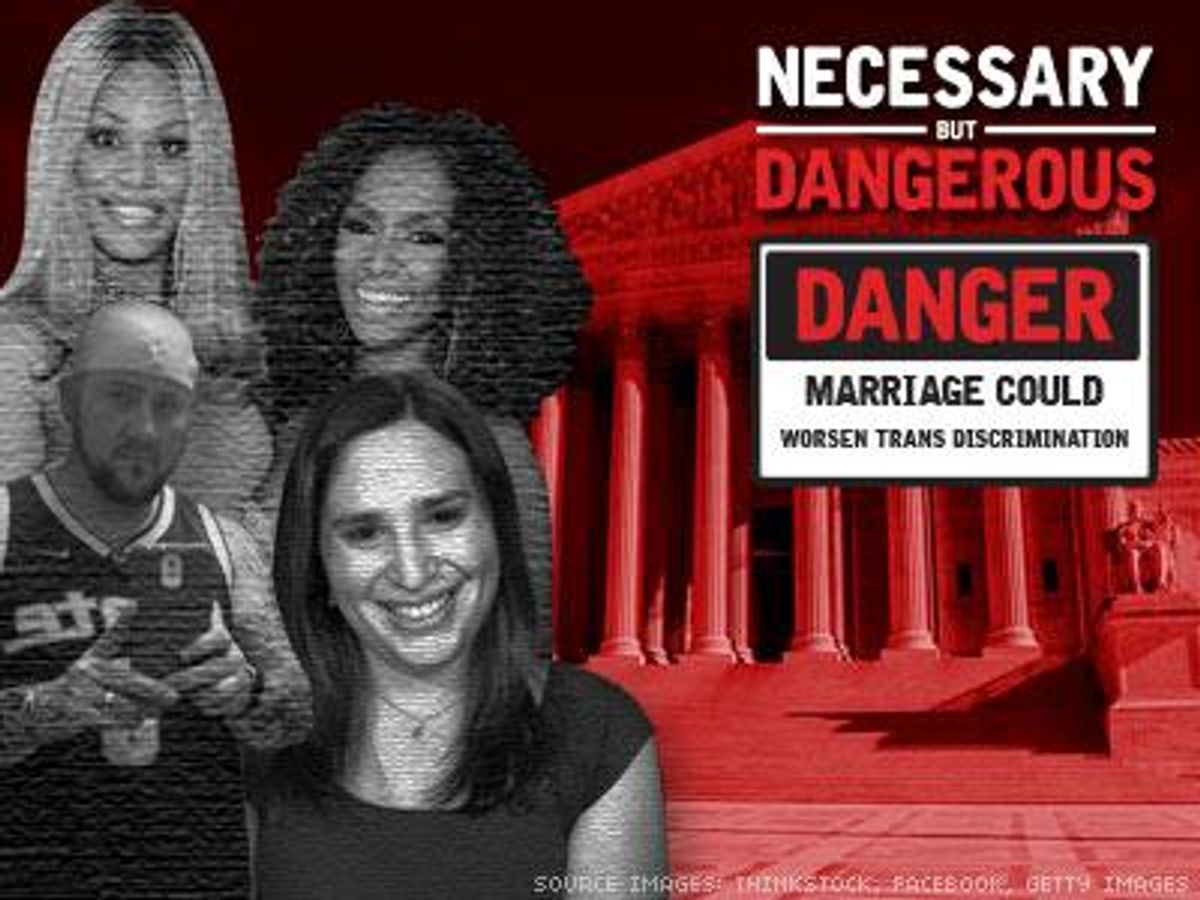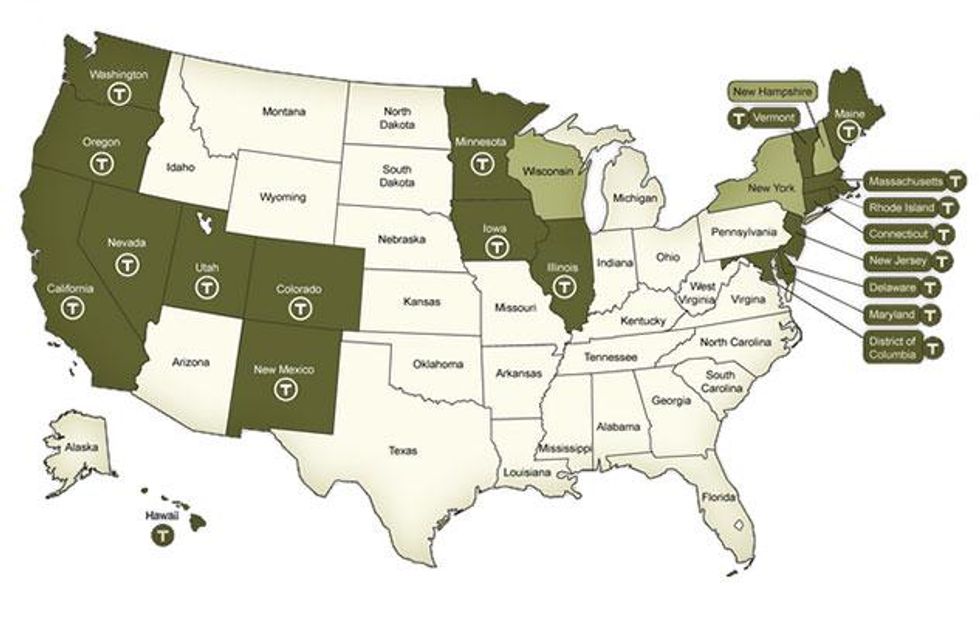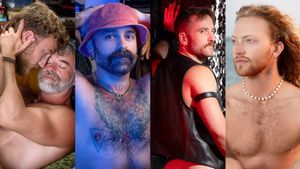While the entire nation waits to see if the U.S. Supreme Court will make marriage equality the law of the land, transgender Americans are bracing for a backlash that's already begun in bathrooms from Florida to Nevada.
Those are just two of the six U.S. states where Republican lawmakers have introduced legislation this year to govern who is entitled to use bathrooms and locker rooms, supposedly to assure the safety of cisgender (nontrans) citizens and protect their privacy. That's ironic, given that trans people are actually the ones at greatest risk of verbal or physical violence when using a public lavatory, compared to their cisgender peers.
But in the U.S. and around the world, there remains a perception in some quarters that "transgender" equals "danger," as evidenced by a transphobic poster that appeared on a British university campus in January, spreading false fears that men and male-to-female transgender women "rape women every 9 minutes."
Teagan Widmer, a transgender woman who developed an app called Refuge Restrooms, which maps gender-neutral restrooms around the world, explained to The Advocate last year, "If I go into the women's room, I might get yelled at. If I go into the men's room, I might get assaulted."
So far, "bathroom bills" in Florida, Nevada and Kentucky have failed to pass, but they're still in the works in Texas, Minnesota, and Missouri. Organizers of a ballot initiative are collecting signatures for a similar effort in California. The proposal in Texas would go so far as to check a restroom-user's DNA to "verify" gender.
For extra incentive, transphobic proposals in Texas and California would reward self-styled "bathroom cops" with a bounty for discovering trans people in restrooms -- reportedly as much as $4,000.
Even the most ardent antigay conservatives likely recognize that apocalyptic talk about the end of society being brought about by two men or two women being able to marry will soon have to be retired. A new monster is required for their scary stories. And the right wing is already field-testing the suggestion that Americans should fear that their public and school bathrooms may be a hiding place for the transgender boogeyman, or worse, the trans boogeywoman.
And the transphobic fear-mongering isn't limited to bathrooms. Minnesota's disingenously named Child Protection League took out full-page ads in local papers last year drawing on the same debunked fears of boys invading girls' bathrooms, while in March, Republican lawmakers in the state filed a bill to repeal a broadly supported high school athletic policy that allows transgender students to play on the sports team that matches their gender identity.
Noted antigay TV personality Michelle Duggar, the matriarch of TLC's 19 Kids and Counting, jumped on the transphobic bandwagon late last year when she recorded a robocall in opposition to a trans-inclusive nondiscrimination ordinance in Fayetteville, Ark.
"I don't believe the citizens of Fayetteville would want males with past child predator convictions that claim they are female to have a legal right to enter private areas that are reserved for women and girls," Duggar warned in the automated call. "I doubt that Fayetteville parents would stand for a law that would endanger their daughters or allow them to be traumatized by a man joining them in their private space. We should never place the preference of an adult over the safety and innocence of a child. Parents, who do you want undressing next to your daughter at the public swimming pool's private changing area?"
After the city council approved the nondiscrimination ordinance, the Duggars subsequently claimed victory in December when the ordinance was repealed in a special election.
Tony Perkins, the noted anti-LGBT leader of the Family Research Council -- which the Southern Poverty Law Center has classified as a Washington, D.C.-based "hate group" -- wrote last month that the Pentagon must reject President Obama's "radical social policies" to lift the ban on open military service by transgender men and women.
"Apart from their practical concerns -- bathrooms, showers, housing, and uniforms -- there is also the very legitimate concern about these service members' instability," Perkins claimed. "Despite how casually the White House seems to treat the matter, these are serious and complex issues that directly affect the national security of the United States. Let's not forget -- transsexualism is at its root a serious mental disorder (one classified as such by the military's own Defense Department!). If these men and women are confused about their gender, what's to keep them from being confused about their mission?"
And lest there be any doubt that conservatives have trans people in their crosshairs, look no further than radio host Rush Limbaugh:
"The transgender community is the gay community of 10 years ago. The transgenders have taken the place of gays who were discriminated against and made fun of and laughed at and so forth. So the transgenders are now occupying the position in the political spectrum where the militant homosexuals occupied 10 years ago.
"You people need to be on the lookout for this. I mean, gay marriage has come to have been the accepted norm, as any other accepted norm is. It's much less controversial as the culture has made moves to assimilate and acculturate that group. But that group is political, and that group needs a cause, and a cause needs a demon. A cause needs a villain. So the cause is transferring itself now from the straight -- well, I was gonna say the straight-out gay community, but moving here from the gay community and the controversies of discrimination against them, now moving to the transgender. They are the next accredited, aggrieved group that will claim grievance after grievance after grievance."
Indeed, all of the usual antigay voices are now talking increasingly about trans people.
And at the front of their torch-bearing mob is Brian Brown, president of the National Organization for Marriage, whose group supports the efforts of Privacy for All, the organization established to fight the law protecting transgender students in California public schools.
"Opening our most vulnerable areas at school including showers, bathrooms and changing rooms to members of the opposite sex is politically-correct madness, that risks the privacy and security of our children and grandchildren," the group claims. "They are forcing our school children to be exposed in showers and bathrooms to members of the opposite sex who claim a 'gender identity' with that sex. This new law doesn't prevent bullying -- it is bullying. It is not about protecting kids; it damages kids."
To counter the coming demagoguery, transgender advocates are pushing for nondiscrimination bills in 10 states as well as in Cleveland and other cities across America. The goal of this rainbow counterinsurgency is to protect people from being fired, denied housing, or turned away from a business because of their sexual orientation or gender identity.
To better understand the patchwork of protections, let's redraw the familiar map of the United States and include only those states with laws against discrimination based on gender identity in employment, housing, and public accommodations -- the key legal protection for transgender Americans. As you can see, a whole lot of America is missing from that map.

Forget the Big Apple, Niagara Falls, or the City of Brotherly Love. Walt Disney World is off the map, along with the entire Gulf Coast. The Gateway Arch also disappears, along with the Grand Canyon, the Carolinas, New Orleans, all of Texas, and so much more.
The United States of Transgender America is just 19 states, plus the District of Columbia. Utah does not provide public accommodations protection, and Massachusetts covers only sexual orientation in public accommodations. Most states have absolutely no statewide protections against discrimination on the basis of gender identity.
There are some federal protections. A 2012 ruling by the federal Equal Employment Opportunity Commission extended Title VII's prohibition on sex discrimination to transgender and gender-nonconforming people, a decision affirmed by the U.S. Department of Justice late last year.
But when you're trans and the laws on the books in your city or state don't reflect that kind of protection -- or, in some cases, remove those protections, as happened April 7 in Springfield, Mo. -- you live your life on guard.
With such a state of affairs, some trans folks feel they must take action on their own to protect their basic rights. Michael Hughes of Minnesota launched a high-trending Twitter campaign, #WeJustNeedtoPee, in hopes of generating support; he was met with criticism when some mistook his staged selfies as invasions of privacy.
"All the women in the photos are friends and or family," Hughes told The Advocate in March, "and we had one of the women check the bathroom first."
He said discussion of how these transphobic laws might impact transgender men is nearly absent in the heated legislative debate on these bills. "Regardless of my genitalia -- since they like to take it to that level -- I don't think I'm quite what they pictured when they were thinking up this legislation," Hughes explained. "I knew I could get at some of these conservatives by showing them a tall bearded man in a women's bathroom."
Then there's a woman in her 50s living in Texas, who asked to be not identified, but told The Advocate she never leaves the house and never enters a ladies' room without a letter in her purse from her doctor. It certifies she is undergoing a gender transition and that part of that process is to use restrooms corresponding with her female presentation. "I don't dare risk not having it with me. I'm tall, and if I get clocked [a term used by many people in transition to describe someone recognizing them as trans], I am not going to jail. Not again."
Hannah Elyse Simpson, 30, is a single bisexual woman, an osteopathic medical school student in New York City who is active in both the trans and Jewish communities. She has had a fair number of encounters with authority figures, including Transportation Security Administration agents who recently questioned her about the brightly colored plastic sticks in her carry-on bag: vaginal dilators, which transgender women who have undergone gender confirmation surgery must use daily. Having to explain their intimate purpose to strangers at a security checkpoint is at the very least awkward, and not just for the agents.
"There are lots of reasons trans people fear police and TSA interactions, but it all stems back to the notion even we internalize as trans people, that who and what we are, or to transition, is inherently a 'deception,'" she explains. "As such, any interaction, even a routine screening, can potentially require revealing the 'deception' and discussing things about ourselves that are very private, to say the least."
"Officers are people too, who carry their own personal biases, which we are unable to predict," she adds. "So the fear of revealing ourselves naturally leads to fearing how we will be treated: Will we be mocked, will our needs be ignored, will we be detained for further inspection?"
The crux of any law that potentially discriminates against trans people is the potential that it could lead to detention, arrest, or imprisonment. Being arrested is an even greater fear for someone trans who has not had gender-affirming surgery.
That's largely because few police departments have been properly trained in how to process trans suspects, and stories of abuse are rampant. Too few jails and prisons have adopted policies such as that recently put in place in Georgia, which now considers gender identity before segregating an inmate by gender. Elsewhere, transgender prisoners are routinely assigned to cellblocks matching their gender assigned at birth.
"As for antitrans laws ... this is not something for humanity to be proud of," says Simpson, "but simply a reminder that it is our duty to advance the work of those from whom our own rights were paid for in sweat, tears, if not blood."
The problem is the fight for transgender civil rights isn't as clear as the struggle for marriage equality, whose protagonists won hearts by framing it as a battle to love and be loved.
Transgender Americans don't yet have a unified rallying cry that resonates, and their numbers are so small that estimates of the size of the community vary greatly. An April 2011 study by the Williams Institute estimated there are 1 million trans people in the U.S., and that was largely before coming out as trans became a media sensation.
"Trans people are coming out more and are being depicted better in popular culture," Mara Keisling, executive director of the National Center for Transgender Equality, tells The Advocate. "But this is happening just as the folks who hate LGBT people are realizing that they've lost the marriage fight. For some reason, they're now turning their unctuous outrage on trans people and our ability to participate fully in society. They'll lose this fight too."
Necessary But Dangerous: If the Supreme Court rules in our favor, not all of the effects will be positive. This is the third entry in The Advocate's special series that explores those possibilities. Find the previous entries here.


















































































